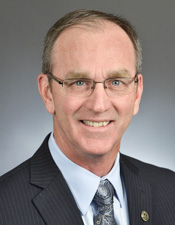Controversial bill to reorganize PCA Citizens’ Board takes first step
When a large dairy farm sought to expand its operations in western Minnesota last year, the Pollution Control Agency’s Citizens’ Board voted against the recommendations of PCA staff and required an in-depth Environmental Impact Statement of the project before it could move forward.
For Kathy DeBuhr, a farmer who lives near Chokio and a mile from the proposed feedlot, that decision meant a reprieve from the truck traffic, dust and other negative environmental impacts she says she’s experienced from a similar operation 6 miles away. For others, however, the ruling demonstrates the uncommon power this nine-member board has to delay or derail projects on the verge of approval after months, sometimes years, of work.
The House Environment and Natural Resources Policy and Finance Committee heard testimony Thursday on a bill that would strip away much of that power.
HF1394, sponsored by Rep. Dan Fabian (R-Roseau), would eliminate a good deal of the board’s permitting authority and its ability to require an EIS. It would also allow citizens to request the board hold a public hearing within 30 days of receiving a petition that has at least 25 signatures.
“It’s a new path for citizen involvement,” Fabian said. “It occurs earlier in the process for a permit application or an EIS possibly, and the threshold to trigger appearing before the Citizens’ Board is really quite small.”
The committee adopted two amendments to the bill before approving it 14-7 on a roll-call vote, which now moves it on to the House Government Operations and Elections Policy Committee. The first, H1394A1, was a technical amendment, but the second, A15-0159, made a substantive change to the board’s composition. It added language that would require half the board members to come from outside the seven-county metro area.
Some see a problem, others don’t
The Citizens’ Board was established in 1967 and its mission is to make decisions “intended to achieve a reasonable degree of purity of the water, air and land resources” while providing for their enjoyment and the welfare of the people. It includes eight members appointed by the governor and confirmed by the Senate to serve staggered four-year terms. The ninth member is the board’s chair, PCA Commissioner John Linc Stine.
Supporters of HF1394 – which currently has 12 co-sponsors, including several Democrats from northeastern Minnesota – say it would speed up the permitting process and give the public more influence on the outcome.
Former PCA Commissioner Peder Larson, who headed the agency for two years during the 90s, said the current process doesn’t provide the public much opportunity to get involved until the very end, when the board meets to make its decision. And this happens after the permitting recommendations have already been made.
“It’s not a very high leverage point for the public to come in and try to influence the process,” Larson said.
Tony Kwilas, Minnesota Chamber of Commerce director of environmental policy, said businesses are bothered by the uncertainty of the process, especially given the investments of time and money that can be necessary to reach the final decision.
However, Rep. Frank Hornstein (DFL-Mpls) said he found that unease puzzling because “if there’s one thing that’s certain based on the record of the Citizens’ Board and the PCA, it’s that (businesses) are going to get their permit.”
Hornstein said he had counted two times in the past eight years when the board may have denied a permit.
“This is a solution in search of a problem,” he said. “We don’t have permits being denied on a regular basis. We don’t have environmental review being ordered on a regular basis. … I’m puzzled by the need for this.”
DeBuhr said the Citizens’ Board was the only place she felt as though her concerns were heard and represented.
“I urge you not to remove the power from the Citizens’ Board,” DeBuhr said. “They are looking out for me.”
Thom Petersen, Minnesota Farmers Union director of government relations, said his organization was opposed to the bill because much of the concern was due to only one situation.
“We do not feel the system is broken,” Petersen said.
But Perry Aasness, executive director of Minnesota AgriGrowth Council, said he spoke for a number of agriculture organizations who supported the bill because it did nothing to roll back existing regulations, while removing the last-minute uncertainty a board decision can cause.
Fabian said the problem the dairy had encountered was not the motivation for his bill. Instead, it was written because of his desire to make the government work better and work faster, and to keep businesses in the state.
“I think this is a good bill,” Fabian said.
The companion to HF1394, SF1683, is sponsored by Sen. Rod Skoe (DFL-Clearbrook) and awaits action by the Senate Environment and Energy Committee.
Related Articles
Search Session Daily
Advanced Search OptionsPriority Dailies
Ways and Means Committee OKs proposed $512 million supplemental budget on party-line vote
By Mike Cook Meeting more needs or fiscal irresponsibility is one way to sum up the differences among the two parties on a supplemental spending package a year after a $72 billion state budg...
Meeting more needs or fiscal irresponsibility is one way to sum up the differences among the two parties on a supplemental spending package a year after a $72 billion state budg...
Minnesota’s projected budget surplus balloons to $3.7 billion, but fiscal pressure still looms
By Rob Hubbard Just as Minnesota has experienced a warmer winter than usual, so has the state’s budget outlook warmed over the past few months.
On Thursday, Minnesota Management and Budget...
Just as Minnesota has experienced a warmer winter than usual, so has the state’s budget outlook warmed over the past few months.
On Thursday, Minnesota Management and Budget...
